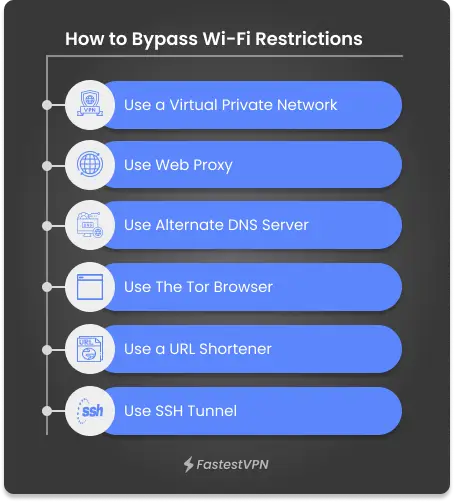

Get 93% OFF on Lifetime
Exclusive Deal
Don’t miss out this deal, it comes with Password Manager FREE of cost.
Get 93% off on FastestVPN and avail PassHulk Password Manager FREE
Get This Deal Now!By Christine Margret No Comments 9 minutes

Most people wonder how to bypass wifi restrictions. You can do so via different methods, including the use of a VPN, web proxy, or using Tor browser. Why do people look for ways to get past internet restrictions? Is it to unblock websites for school homework or access international apps at home? Whatever the reason may be, this guide will show you the best ways to bypass all WiFi restrictions in any country and from anywhere.
Note: Using a VPN is the best way to bypass WiFi restrictions since connecting to a VPN server conceals your IP address and disguises your original location by assigning a new IP address. While other solutions are there, too, we recommend using a reliable VPN only, like FastestVPN, for its advanced security protection and seamless ability to bypass all WiFi limitations.
Wi-Fi restrictions are limitations imposed on Wi-Fi networks by administrators or internet service providers. These restrictions can include controlling who can access the network through authentication, managing the available network capacity by limiting bandwidth, filtering out certain websites or content, and enforcing time-based restrictions.
These measures are implemented to maintain security, optimize network performance, enforce policies, and promote fair and responsible use of the network.
However, with Wi-Fi restrictions, you will no longer be able to watch or access your favorite content even after paying for your network.
Wi-Fi restrictions are imposed for several reasons:
These restrictions ensure network security by controlling who can access the network and preventing unauthorized access.
Restrictions also help manage and optimize network performance by limiting bandwidth usage and preventing network congestion.
Additionally, content filtering restrictions are implemented to comply with legal requirements or enforce acceptable use policies, particularly in environments like schools or workplaces.
Overall, Wi-Fi restrictions are in place to maintain network integrity, protect users, and ensure fair and responsible use of the network. However, there are always ways how to bypass suspended Internet service.
One primary reason for learning how to bypass Wi-Fi restrictions is to bypass network restrictions in Indonesia or other countries so that you can access your favorite websites, apps, and services without hassle. Getting access to international content or websites is one of the main reasons users bypass WiFi restrictions, but other issues like ISP throttling, online censorship, etc., are why users require it. Most students often attempt to bypass internet restrictions in schools or colleges for research work. Most institutes often control access to the internet, limiting options.
If you encounter a blocked website, here are some approaches that can help you with how to bypass wifi restrictions and access your favorite content:

Pros:
Cons:
Note: Always use paid and reliable VPN brands like FastestVPN. Free VPNs are not trusted and can sell your data to third parties.
Wondering how to bypass suspended Internet service? The most popular and effective method for accessing blocked websites is to use a reliable paid VPN.
VPNs offer various benefits, but the key feature is their ability to provide you with an IP address from a different country, bypassing geo-blocks and restrictions.
While some websites may attempt to block VPN IP addresses, VPN providers often find ways to circumvent these measures.
It’s essential to choose a reputable paid VPN service rather than relying on free ones, as free VPNs may compromise your privacy or provide inadequate protection.
If you’re finding out how to bypass WiFi block, then FastestVPN is the best VPN for unblocking websites in school and safely accessing unrestricted internet from anywhere in the world.
Pros:
Cons:
Here’s the second method for how to bypass wifi restrictions, i.e, using proxy websites. These sites offer a similar function to VPNs, allowing you to access blocked websites by masking your IP address.
The main difference is that with proxies, you don’t need to download a separate application or encrypt your entire internet connection.
Instead, you can use a proxy to browse specific tabs in your web browser as if the restrictions didn’t exist and this is one of the easiest ways for how to bypass WiFi block.
If you decide to use proxy websites to bypass restrictions, it’s recommended to opt for premium proxies as they have a higher likelihood of successfully bypassing firewalls and restrictions.
Premium proxies tend to be faster and provide better encryption compared to free proxies.
Free proxies often suffer from slow speeds due to congestion and may not be effective in circumventing advanced restrictions.
Choosing premium proxies increases your chances of accessing blocked websites smoothly and securely.
Pros:
Cons:
DNS, or Domain Name System, is a service that translates domain names into their corresponding IP addresses.
This method of how to bypass WiFi block allows network devices to communicate over a network using IP addresses. DNS servers store this information and handle your internet requests when you browse the web.
By default, your ISP or network administrator configures the DNS you use. However, changing the DNS provider can help you bypass domain name blocks and geo-restrictions imposed by your network.
If changing the DNS alone doesn’t work as a solution to how to bypass WiFi block due to additional blocking mechanisms, a Smart DNS can be helpful.
Smart DNS combines DNS and proxy technologies, routing only your DNS queries through its servers without changing your IP address.
While it doesn’t encrypt your internet traffic, some Smart DNS providers may use VPN technology to encrypt DNS queries.
Premium Smart DNS providers or VPNs that offer Smart DNS are recommended for optimal results. Free reputable DNS providers like Google DNS are also available.
Pros:
Cons:
Here’s the third method for how to bypass wifi restrictions. Using the Tor network for web browsing takes your internet traffic on a fascinating journey through numerous nodes worldwide.
This intricate process greatly reduces the chances of regular websites tracing your request’s origin, making it unlikely to encounter blocking filters.
Tor, with millions of daily users, provides a notable level of anonymity. However, it’s essential to note that Tor and the dark web don’t ensure absolute anonymity and might not be the best solution for how to bypass WiFi block.
Government authorities can monitor individuals of interest on the network, although it is more complex compared to traditional browsers and internet channels.
Pros:
Cons:
Another alternative method for how to bypass WiFi block or domain name blocks is by utilizing shortened versions of the blocked website’s URL.
Instead of using the full name of the blocked website, you can obtain a shortened version from free URL shortening services.
There are several popular URL Shortener services available. These services allow you to create a shorter and alternative URL that can potentially evade domain name blocks and provide access to the desired content.
By using these shortened URLs, you may increase your chances of bypassing Wi-Fi restrictions and accessing blocked websites.
Pros:
Cons:
An SSH tunnel operates similarly to a VPN, facilitating the secure transmission of data through a dedicated tunnel.
This method for how to bypass wifi restrictions isn’t widely utilized due to their technical setup complexity, they are favored by knowledgeable individuals who can remotely configure their own SSH server.
By utilizing an SSH tunnel, all internet traffic for browsing is routed through a secure connection, resulting in encrypted data transmission and the ability to circumvent filtering mechanisms.
However, it should be taken into account that SSH tunnels may experience slower speeds.
Comparing all the methods discussed, it becomes evident that a VPN is the most effective solution for how to bypass suspended Internet service.
This is due to its distinct features and advantages. A VPN allows you to mask your IP address, ensuring anonymity while creating an end-to-end encrypted tunnel for secure data transmission.
It provides complete online security and privacy and is incredibly user-friendly with a simple one-tap activation.
Furthermore, a VPN can be used anytime and anywhere, and it is compatible with various devices, making it a versatile solution for how to bypass suspended Internet service.
You can sign up for FastestVPN to bypass content restrictions and access your favorite websites from anywhere restriction-free.
To set up FastestVPN as a solution for how to bypass WiFi block, follow these steps:
You can bypass the restricted mode on WiFi via a VPN, proxy, or Tor browser. For VPN, we only recommend using a premium VPN, like FastestVPN. You bypass WiFi restrictions by using a VPN, proxy, or Tor browser. Using any of these solutions, conceal your IP address, ensuring digital anonymity. This tricks the network into your location. You can access websites that are blocked by WiFi by using a reliable VPN, a TOR browser, or a proxy. We recommend using a VPN since that makes bypassing geo-restrictions a breeze without compromising your data. Here’s how you can bypass a router ban:FAQs - How to Bypass WiFi Restrictions
How do I bypass restricted mode on Wi-Fi?
How do I bypass Wi-Fi download restrictions?
How to access websites that are blocked by Wi-Fi?
How to bypass router ban?
Bypassing Wi-Fi restrictions can be achieved through various methods discussed. Utilizing a VPN proves to be an effective solution. It masks your IP address, ensures anonymity, establishes an encrypted tunnel, and provides online security and privacy.
Other approaches like web proxies and Smart DNS answer your question of how to bypass suspended Internet service.
It is crucial to understand the limitations and potential risks associated with these methods, as government authorities can still monitor activity on certain networks.
Ultimately, the choice of method depends on individual preferences, technical expertise, and the level of anonymity and access desired.
However, using a VPN is by far the safest and the most authentic method for bypassing network restrictions worldwide.
© Copyright 2024 Fastest VPN - All Rights Reserved.


Don’t miss out this deal, it comes with Password Manager FREE of cost.
This website uses cookies so that we can provide you with the best user experience possible. Cookie information is stored in your browser and performs functions such as recognising you when you return to our website and helping our team to understand which sections of the website you find most interesting and useful.
Strictly Necessary Cookie should be enabled at all times so that we can save your preferences for cookie settings.
If you disable this cookie, we will not be able to save your preferences. This means that every time you visit this website you will need to enable or disable cookies again.


